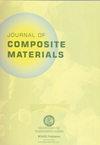基于 PAN 纤维的碳-碳增强复合材料,可提高恶劣环境下的阻燃性、导热性和导电性
IF 2.4
3区 材料科学
Q3 MATERIALS SCIENCE, COMPOSITES
引用次数: 0
摘要
碳-碳(C-C)纤维复合材料是一类新型材料,因其优异的化学、热和导电特性而被广泛应用于各行各业。本研究制造了碳-碳纤维复合材料,将聚丙烯腈(PAN)粉末溶解在二甲基甲酰胺(DMF)溶液中,通过蒸发和凝固将所需浓度(20-80 wt%)的碳纤维浸入该溶液中作为增强材料。然后将 PAN 纤维体系在 250-270°C 的空气中稳定 120 分钟,随后在氩气存在下在 650、750 和 850°C 的温度下碳化 60 分钟,以获得所需的 C-C 纤维复合材料。热重分析(TGA)结果表明,碳化样品的重量损失较小,仅为 2.5%,而实际样品和氧化样品的重量损失较大。此外,由于碳的存在和表面纹理的变化,碳化样品表面比其他样品更疏水。傅立叶变换红外光谱峰显示,氧化和碳化前 PAN 存在不同的官能团,但氧化和碳化后这些峰消失了。开发的碳-碳复合材料通过了 UL94 垂直阻燃测试,阻燃等级为 V-0。扫描电子显微镜(SEM)结果证实了表面的平滑性、基体和增强体的适当结合,共聚焦显微镜图像也验证了所制造的复合材料性能的变化。碳-碳纤维复合材料在碳化过程后的电导率值高达 4.75 × 103 S/m。这些复合材料优异的热学、化学和电学特性可用于不同极端环境下的多种工业应用。本文章由计算机程序翻译,如有差异,请以英文原文为准。
PAN-based fiber-reinforced carbon-carbon composites for improved fire retardancy and thermal and electrical conductivities for harsh environments
Carbon-carbon (C-C) fiber composites are a new class of materials that are used in various industries due to their exceptional chemical, thermal and electrical conductivities properties. In this study, carbon-carbon fiber composites were manufactured where polyacrylonitrile (PAN) powder was dissolved in dimethylformamide (DMF) solution, and carbon fibers with desired concentrations (20–80 wt%) were immersed into this solution as reinforcement through evaporation and solidification. The PAN-fiber systems were then stabilized at 250–270°C for 120 min in the air and subsequently carbonized at 650, 750, and 850°C for 60 min in the presence of argon gas to obtain the desired C-C fiber composites. Thermogravimetric analysis (TGA) results showed that the carbonized samples had a small weight loss of 2.5%, while actual and oxidized samples had more weight loss. Moreover, the carbonized sample surface was more hydrophobic compared to other samples due to the carbon presence and surface texture changes. Fourier-Transform Infrared (FTIR) spectroscopy peaks showed the presence of different functional groups of PAN before oxidation and carbonization, but those peaks disappeared after oxidation and carbonization. The developed carbon-carbon composite passed the UL94 vertical flame retardancy testing with a V-0 rating. Surface smoothness, proper matrix and reinforcements bonding were confirmed by scanning electron microscopy (SEM) results and the manufactured composite properties changes were validated by the confocal microscopy images. The carbon-carbon fiber composite achieved an electrical conductivity value up to 4.75 × 103 S/m after the carbonization process. The excellent thermal, chemical, and electrical properties of these composites can be useful for numerous industrial applications in different extreme environments.
求助全文
通过发布文献求助,成功后即可免费获取论文全文。
去求助
来源期刊

Journal of Composite Materials
工程技术-材料科学:复合
CiteScore
5.40
自引率
6.90%
发文量
274
审稿时长
6.8 months
期刊介绍:
Consistently ranked in the top 10 of the Thomson Scientific JCR, the Journal of Composite Materials publishes peer reviewed, original research papers from internationally renowned composite materials specialists from industry, universities and research organizations, featuring new advances in materials, processing, design, analysis, testing, performance and applications. This journal is a member of the Committee on Publication Ethics (COPE).
 求助内容:
求助内容: 应助结果提醒方式:
应助结果提醒方式:


